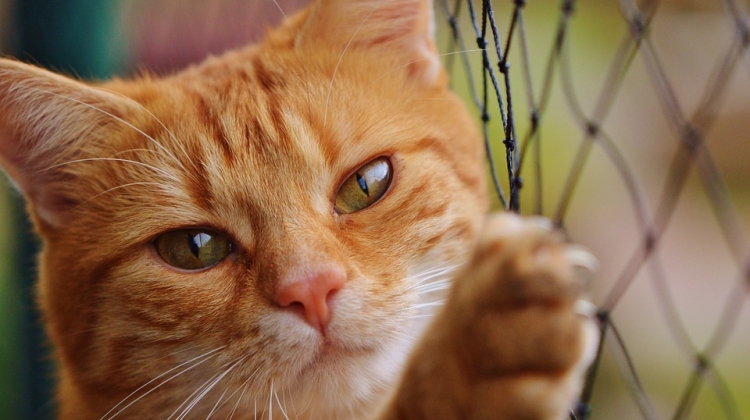Roberta
Ven 2 Febbraio 2018
0
Receiving a positive result on their cat’s FIV test scares many owners, just as many people avoid considering the adoption of an FIV+ cat because they are frightened by the condition. Let’s understand a little better what it is and above all understand a very important thing: an FIV+ cat can still live many years of a fully satisfying and happy life; FIV+ does not necessarily mean "dead" or "dying"!
WHAT IS FIV?
The acronym FIV stands for Feline Immunodeficiency Virus, it indicates the presence of a virus that affects a cat’s immune system making it more vulnerable to other infections. A bacterium, virus or other infective microorganisms, that are usually harmless thanks to the cat’s immune system, could cause a serious disease in an FIV+ cat. It is not the immunodeficiency virus in itself which kills the cat, but all the other potentially dangerous viruses and bacteria, which can easily infect the cat due to the absence of a fully functioning immune system, and can therefore attack the cat's body and cause him serious illness or death.
HOW IS FIV TRANSMITTED FROM CAT TO CAT?
The main route of transmission of FIV is a deep bite, one deep enough to pierce the skin and create a contact between saliva and blood. Cats that fight for mating and/or territory, as well as cats that mate (during mating, the male bites the neck of the female, often deeply), are the subjects most at risk of contracting the FIV.
FIV is NOT transmitted only through a simple and peaceful contact between healthy cats and infected cats, it is NOT transmitted indirectly through the clothes or shoes of people who have touched infected cats, it is NOT transmitted through the air.
HOW CAN YOU PREVENT IT?
The existing FIV vaccination is not very effective and usually unavailable or generally even not recommended. The best prevention methods are the following: sterilizing infected cats and cats that live freely outdoors; regular checks through the appropriate FIV test for owned cats and colony cats; taking measures to prevent fighting and/or aggression between infected cats and healthy cats by separating them in case of difficulties in cohabitation that could result in aggression.
The most commonly used test to detect the presence of FIV looks for the presence of FIV antibodies in the blood, whose presence usually indicates the presence of the virus. Yet, since the cat’s body may take some time to produce antibodies to the virus, in case of a negative result to the test it is advisable to repeat the test after a few months in agreement with the veterinarian.
HOW DOES A FIV+ CAT LIVE?
Exactly like the others! Unless he has already contracted any other disease, an FIV positive cat leads a normal cat life; he needs to play and interact, needs daily stimulation and activity, he sleeps, eats, runs and jumps, he isn’t ugly and does not smell bad.
An FIV positive cat needs to live in a protected environment where he’s less likely to come into contact with other pathogens, so usually a domestic context is more suitable to ensure the FIV+ cat greater safety and less exposure to pathogens.
Naturally, he will be more likely to contract various types of disease, so regular visits to the vet are essential to keep its health under control. An FIV+ cat has a shorter life expectancy than a healthy cat, but this does not mean it cannot live a normal and happy life. The cat’s life, however, always depends on physical and psychological individual differences.
IS FIV CONTAGIOUS FOR HUMANS?
FIV is often compared to HIV because of strong similarities, but it is a highly species-specific virus, and there have been no proven cases of FIV transmission from cats to humans. Transmissions have only ever happened between cat and cat. However, people suffering from immune deficiency conditions (compromised immune system) should always consult their doctor before living with a sick animal, regardless of the animal and the type of illness by which it is affected.
WHY ADOPT AN FIV+ CAT?
- Because he needs a safe and secure environment in which to live his life to the fullest.
- Because an FIV+ cat loves, lives, feels just like any other cat.
- Because an FIV+ cat is not a faulty cat, it is simply a cat with specific individual needs, like any other cat.
- Because the cat shelters are full of FIV+ cats, often young cats, who are limited to spend the rest of their lives in a cage and in a environment that, even at best, will undoubtedly be a source of stress and put the cat at greater risk of contracting diseases.
- Because in many cases coexistence between FIV+ cats and healthy cats is possible, given that they are monitored by a veterinarian and experts in the field to ensure the safety of all the cats involved.
Let’s remember to always consult a veterinary doctor, and never be afraid to ask for help if our cat is diagnosed with FIV. It is not a death sentence, it is only a change in its health state that requires some precautions to allow for a more than satisfactory quality of life even up to several years.
For more detailed information http://www.vet.cornell.edu/FHC/health_information/brochure_fiv.cfm


Aggiungi un commento